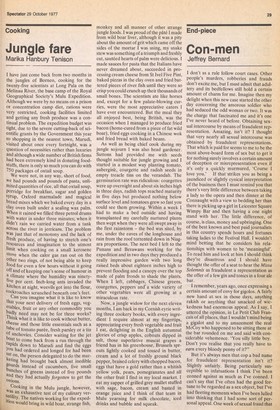Cooking
Jungle fare
Marika Hanbury Tenison
I have just come back from two months in the jungles of Borneo, cooking for the twenty-five scientists at Long Pala on the Melinau River, the base camp of the Royal Geographical Society's Mulu Expedition. Although we were by no means on a prison or concentration camp diet, rations were very restricted, cooking facilities limited and getting any fresh produce was a continual problem. The expedition budget was tight, due to the severe cutting-back of scientific grants by the Government this year so shopping in the nearest town, Marudi, visited about once every fortnight, was a question of necessities rather than luxuries and although a wide number of British firms had been extremely kind in donating foodstuffs, there is only so much you can do with 750 packages of oxtail soup. We were not, in any way, short of food, we had pounds and pounds of pasta, unlimited quantities of rice, all that oxtail soup, Porridge for breakfast, sugar and golden Syrup, Oxford marmalade and magical bread mixes which we baked every day in a clay oven built under a sealing wax palm. When it rained we filled three petrol drums With water in under three minutes; when it didn't rain we carried water from a tank across the river in jerricans. The problem was just that of monotony and the lack of fresh produce, of having to stretch one's resources and imagination to the utmost limit when cooking on a small kerosene stove when the calor gas ran out on the Other two rings, of not being able to keep food for even a few hours without it going off and of keeping one's sense of humour in a climate where the humidity was ninetyfive per cent. Inch-long ants invaded the kitchen at night, weevils got into the flour, Cockroaches scrunched beneath one's feet. Can you imagine what it is like to know that your next delivery of fresh eggs, vegetables, fruit or any other commodity you badly need may not be for three weeks? Think what it is like to cook without butter, cheese and those little essentials such as a tube of tomato purée, fresh parsley or a tin of anchovies. Consider waiting for the jet boat to come back from a run through the rapids down to Marudi and find the eggs You had ordered and longed for had been sat on, the person delegated to do the marketing had brought back almost inedible gourds instead of cucumbers, five small bunches of greens instead of five pounds and they had actually forgotten to get the onions.
Cooking in the Mulu jungle, however, was an exhaustive test of my culinary versatility. The natives working for the expedition would bring in wild boar, strange fish, monkey and all manner of other strange jungle foods. I was proud of the pâté I made from wild boar liver, although it was a pity about the amount of grit which came off the sides of the mortar I was using, my snake stew was something of a triumph and freshly cut, sautéed hearts of palm were delicious. I made sauces for pasta that the Italians have never dreamed about, succeeded in processing cream cheese from St Ivel Five Pint, baked pizzas in the clay oven and fried battered pieces of river fish until they were so crisp you could crunch up their thousands of small bones. The scientists ate like horses and, except for a few palate-blowing curries, were the most appreciative eaters I have ever encountered. But the meal they all enjoyed best, being British, was the occasion when I managed to produce fried bacon (home-cured from a piece of fat wild boar), fried eggs cooking in a Chinese wok and fried bread with baked beans.
As well as being chief cook during my jungle sojourn I was also head gardener. Suttons had provided me with seeds thought suitable for jungle growing and I started in a modest way planting tomato, aubergine, courgette and radish seeds in empty treacle tins on the verandah. The germination rate was ridiculous: courgettes were up overnight and about six inches high in three days, radish tops reached maturity in five days but produced nothing below surface level and tomatoes grew so fast you could see them growing. Within a week I had to make a bed outside and having transplanted my carefully nurtured plants then wept when they were all swept away in the first rainstorm — the bed was sited, by me, under the eaves of the longhouse and rain from the roof torrented down in Niagara proportions. The next bed I left to the Punans and Berawans working for the expedition and in two days they produced a really impressive garden with two long raised beds about eighteen inches high to prevent flooding and a canopy over the top made of palm fronds to shade the plants. When I left, cabbages, Chinese greens, courgettes, peppers am: 1'a wide variety of other vegetables were all growing at a miraculous rate.
Now, a jungle widow for the next eleven months, I am back in my Cornish eyrie writing three cookery books, with every ingredient I require almost at my fingertips, appreciating every fresh vegetable and fruit I eat, delighting in the English autumnal glories of crisp apples, cobnuts dipped in salt, those superlative muscat grapes a friend has in his greenhouse, Brussels sprouts lightly cooked and tossed in butter, cream and a lot of freshly ground black pepper, braised celery with chopped bacon, eggs that have a gold rather than a whitish yellow yolk, pears, pomegranates and all the other fruit I find in my local market. I eat my supper of grilled grey mullet stuffed with sage, bacon, cream and basted in orange juice and I think of that team in Mulu yearning for milk chocolate, iced drinks and bubble and squeak.


































 Previous page
Previous page